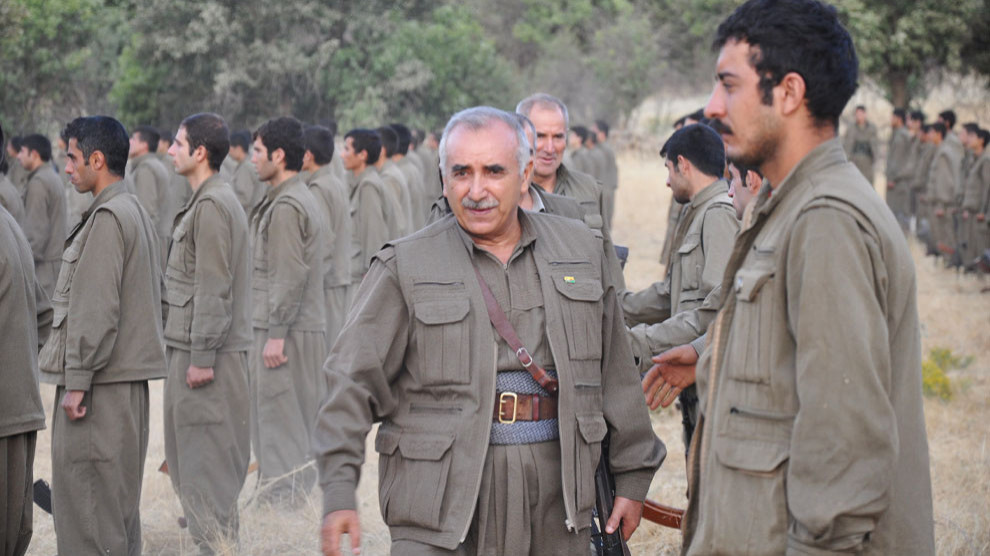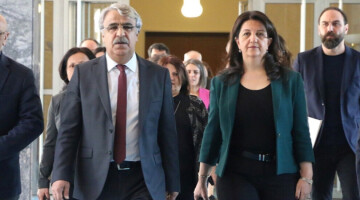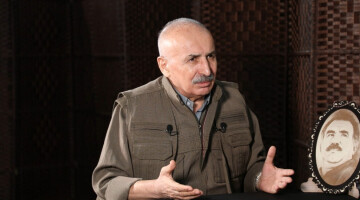Under the pretext of PKK presence, Turkey is currently carrying out a ground and air invasion in Southern Kurdistan. However, in view of the locations of the Turkish bases on occupied hills in the northern mountainous regions of Southern Kurdistan, the border lines of Misak-ı Millî (National Pact) are clearly visible. This National Pact was supposed to mark the new borders of the Turkish state after World War I in the negotiations with the victorious powers over the Ottoman Empire - the old provinces of Mosul (today's South Kurdistan up to the Kurdish city of Sulaymaniyah on the Iranian border) and Aleppo (besides the region of Aleppo the whole of Rojava/North and East Syria) were supposed to belong to the Turkish territory in addition to Batumi and Thrace.
Similar to Northern Syria, the PKK is again only an excuse for the Erdoğan government to annex foreign land to its own national territory. Ankara is not hiding the fact that the Turkish state wants to establish a 35 to 40-kilometre-wide "buffer zone" and that this occupation is not meant to be temporary anyway.
Murat Karayilan, the commander-in-chief of the central headquarters of the People's Defence Forces (HPG), who is also a member of the Executive Council of the Kurdistan Workers' Party (PKK), drew attention to this in a recent special programme on current developments in the region on Stêrk TV (some excerpts from the programme can be found here). Karayilan also pointed out that the Yazidi settlement area Shengal (Sinjar) is wanted to be equally occupied. For some time now, Ankara has been referring to both Shengal and the UN-protected Maxmur refugee camp in the district of the same name, southwest of the capital of the South Kurdistan autonomous region of Hewlêr (Erbil), as "military camp" and "retreat space" of the PKK. Murat Karayilan said: "There is a small contingent of defense forces near Maxmur that protects the local population from ISIS attacks. Only a few months ago, the ISIS attacked Maxmur. Two jihadists were killed, and one member of the defence forces was killed. This is a small unit that defends Maxmur in case of a threat. The contingent therefore does not constitute a force to be bombed with airplanes."
No PKK presence in Shengal
"In Shengal on the other hand we have no forces. It is claimed that YBŞ is identical with PKK, this is not true. Firstly, I would like to point out that it wasn't the PKK that drove the Peshmerga out of Shengal. This claim is presented in order to legitimize the attacks, but it is not true. This approach is also fundamentally wrong. What would have happened in Shengal if we had not intervened selflessly? At least 100,000 people from our Yazidi community would probably have been massacred, the roots of Yazidism would have been wiped out. We don't ask to be thanked for this, after all it is our people we have protected. We even took this step too late, for which we are taking ourselves very hard to judge. There are, however, some people, including Yazidis, who nevertheless hold us in contempt and are hostile towards us. If it were not for us, there would be no one left there today. We opened up a corridor and led 150,000 people into Rojava. Have we committed a sin by doing so? There is a proverb, " redde caesari quae sunt caesaris” [Render unto Caesar that which is Caesar's].”
How did the Peshmerga leave Shengal?
When the ISIS invaded Shengal in August 2014, the Peshmerga of the KDP-led government in Hewlêr (Erbil) withdrew and left the Yazidis defencelessly in the hands of the ISIS. Those who were able to flee sought the way into the mountains. There, twelve PKK guerrilla fighters first protected the entrance to the Jabal Shengal area and prevented the jihadists from entering. From the mountains at the Turkish-Iraqi border in Northern Kurdistan and from Rojava, more guerrilla fighters and members of the People's and Women's Defense Units YPG/YPJ rushed up with heavy weapons three days later. Through their established escape corridor, 50,000 people were able to reach Rojava already in the first days of the genocide.
"After we intervened in Shengal, we later opened the corridor for the Peshmerga as well. In 2017, the independence referendum was held, as a result of which the Iraqi army, at the instigation of Turkey, became active in Kirkuk and Shengal. The Peshmerga Command stationed in Shengal then sought to talk to our friends. They wanted to give up their positions in the city and join our friends in the mountains. We were informed of this and our reply was: 'Okay, let them hold the positions together. When the Iraqi army comes, just tell them that they are will not be fighting them, but that they hold their positions’. The Peshmergas actually joined our friends in the mountains and only two hours later, on the orders of the Peshmerga commander, they withdrew in the middle of the night. They thanked us and even asked if they could leave the region via the corridor to Rojava- as they had done in Shengal case- because the Iraqi army held the way leading to Rabia. We said, let's wait for the next morning and talk first with the friends from the YPG. Shortly after, it was said that the Iraqi military had cleared a path for the Peshmerga, through which they finally left Shengal".
Guerrilla withdrew in 2018
The guerrillas stayed for a while, Karayilan noted and continued: "When the Iraqi troops arrived [in Shengal], they saw our posts. We said: 'We don't want to fight you, but we won't give up our positions'. Then there were negotiations on the basis of dialogue - so there was no war between us. My point is that we didn't drive anyone away from Shengal This is how it happened in October 2017. Then in April 2018 we withdrew our forces from Shengal, even though nobody asked us to do so. We realized that we were no longer needed there. Iraq was represented again and YBŞ existed, which could take care of the security and defense of their region. Therefore the HPG withdrew completely from Shengal. None of us stayed."
YBŞ members are portrayed as PKK fighters
“A deadly air raid by Turkish fighter jets killed [on 15 January 2020] the YBŞ commander Zerdeşt Şengalî, his brother Şervan Cîlo and his friends Hemîd and Êzdîn; the precious sons of Shengal. However, only an hour after this attack, a person named Heydar Şeşo said on TV that an attack on a PKK quarter had taken place. Were these young people not Yazidis? Why are portraying them as “PKK fighters” and make them into a target? By presenting all the young people who organise themselves under the umbrella of YBŞ as PKK members, they are being made into a target. People like these lack conscience and dignity. There is also a former district governoe who is constantly saying somewhere that the PKK is still represented in Shengal and that there is a security problem because of this. I propose that an independent delegation go and form its own view of the situation on the ground.”
Yazidis need their own defence, administration and autonomy
"In Shengal there is only the YBŞ/YJŞ. When we sent twelve of our friends there in the beginning, they got to know the people. Of course, we already knew the Yazidi people and also the youth who resisted the Firman [genocide] together with our fighters. One of them was Zerdeşt, the other was Berxwedan. He was killed in battle at that time. Under the impression of the war, they founded their own organization and called it YBŞ. We supported them, trained them, because we wanted them to form their own force. There is only one thing that counts for us: the people in Shengal, as an organised society, should take care of their own defence and administration and have an autonomous status. In this sense we are always with the Yazidi people and Shengal. This community has suffered at least 73 genocides, no matter where there are Yazidis, we will stand by them. It's a question of mentality, but it doesn't mean that all Yazidis are members of our party.”
YBŞ are deliberately targeted
"Today there are tens of thousands, hundreds of thousands of Arab people who are adopting the ideas of Rêber Apo [Abdullah Öcalan]. We know of even more determined Apoists in Baghdad and Basra. In Argentina there are Apoists and Apoist youth movements that are organizing themselves. They also exist in Pakistan. Rêber Apo has presented humanity with a new paradigm, an alternative. Not everyone who shares this philosophy is a PKK member. Such circles, which portray the YBŞ to be alleged PKK fighters, deliberately make the Yazidi youth of Shengal a target. They are people who do not want the Yazidi people to defend and administer themselves. In the meantime, the Yazidis have developed friendly relations with the Arab people, based on the perspective of a democratic nation. Many eminent Arab revolutionaries have joined the ranks of YBŞ, thus helping to make the resistance units grow and become stronger. This makes certain people uncomfortable."
Some Kurds are instrumentalized
"We had some Yazidi members from Armenia and Russia. Some of them fought in our ranks for eight years, others even ten years in the Zagros Mountains and Botan. When the last genocide against Yazidis took place, they wanted to counter the genocide and expressed the desire to participate in the defense of their people. Some of them are now commanders of YBŞ. Although this is common knowledge, I do not want to mention any names now. However, if it is absolutely necessary, they could be named too. The names of these few people, which everyone knows, are now appearing on certain lists ["terror lists" of the Turkish government]. Zekî Şengalî was murdered in this way, and now these friends are wanted to suffer the same fate. Will the YBŞ disappear from the scene when these people are no longer among us? They may be former PKK members, but now they are members of the YBŞ.
Turkish state has already deployed forces in the Bashika region. So, Turkey sets its eyes on Shengal and openly targets it. In principle, they wanted to smash Shengal via the ISIS option because they consider the region to be within the borders of the National Pact. Unfortunately, there are some Kurds who are instrumentalized for the policy of the fascist Turkish state. I hope for their sake that they will soon understand this plan and give it the cold shoulder. They should refrain from targeting the Yazidi people in Shengal and its autonomous structures."
The Turkish state wants to complete what the ISIS did not succeed
"Another attention-grabbing detail is that with Shengal and Maxmur, the locations are now being targeted by the Turkish state's hets, which the ISIS had previously wanted to destroy by genocide. The goal is the same. Here it becomes clear once again that the Turkish state wanted to smash first Shengal, then Maxmur and then the whole region of Southern Kurdistan and its federal system by the hand of the ISIS. But the ISIS was defeated, so this plan did not succeed. Now Turkey is implementing it itself. This is the reality. And one more small hint: When the ISIS attacked Southern Kurdistan, the regional government, especially the KDP, asked Turkey for support. But the hoped-for help was denied to the KDP. It was anyway Turkey’s plan to eliminate the status of Southern Kurdistan by means of ISIS.”
RELATED NEWS:














